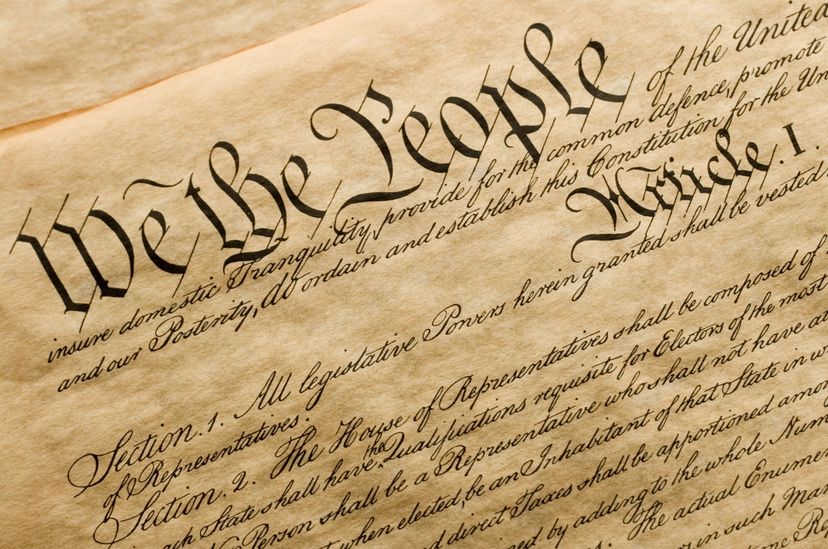
About This Quiz
How much do you know about the civil liberties of U.S. citizens? Don't plead the Fifth — take this quiz to find out.The Bill of Rights consists of amendments to the Constitution that ensure basic rights and freedoms to American citizens.
The first 10 amendments to the Constitution make up the Bill of Rights.
The First Amendment of the Constitution guarantees freedom of the press. Courts have ruled that censorship of information may not occur before it is published, with the rare exception of clear threats to national security.
Advertisement
The right to bear arms is not guaranteed by the First Amendment. The five liberties ensured by the First Amendment are freedom of religion, freedom of speech, freedom of the press, freedom of peaceable assembly and freedom to petition the government.
When crafting the Bill of Rights, Madison relied heavily on the Virginia Declaration of Rights written by George Mason.
The Second Amendment to the Constitution provides the right to keep and bear arms. There is disagreement as to whether the Second Amendment applies to the rights of individual citizens or more broadly to militias.
Advertisement
The 27th Amendment to the Constitution was originally the Second Amendment. Madison's original Second Amendment prohibited Congress from giving itself a pay increase.
James Madison originally proposed 19 amendments to the Senate. Of the 19, Congress approved 12, and the states ratified 10.
Madison served as the fourth president for two terms, from 1809 to 1817.
Advertisement
The 2008 case District of Columbia v. Heller upheld the rights of individuals to own firearms for legal purposes, such as self-defense within the home.
The Anti-Federalists only ratified the Constitution with the provision that amendments be added. These amendments were intended to safeguard the civil liberties of individuals and to preserve states' rights.
The Third Amendment of the Constitution states, "No soldier shall, in time of peace be quartered in any house, without the consent of the owner, nor in time of war, but in a manner to be prescribed by law."
Advertisement
The Quartering Act was passed by the British Parliament on March 24, 1765. The Quartering Act required American colonists to house British soldiers in their private residences if needed.
Congress passed the Bill of Rights on Sept. 25, 1789.
The Fourth Amendment provides "the right of the people to be secure in their persons, houses, papers and effects, against unreasonable searches and seizures."
Advertisement
As set fourth in the 1914 U.S. Supreme Court case Weeks v. United States, probable cause must be used to obtain a search warrant before collecting evidence from an individual's private property.
Reasonable suspicion is a lower standard that requires neither probable cause nor a search warrant.
The states ratified the Bill of Rights on Dec. 15, 1791.
Advertisement
The double jeopardy clause prevents a person from being tried or punished more than once for the same crime. This protection currently applies to all cases in which a defendant can face jail time. However, an individual can be tried for the same crime more than once in civil court.
The 1966 case required authorities to advise people of their Fifth Amendment right not to make self-incriminating statements. This statement is known as the Miranda rights, or Miranda warning.
The right to a speedy trial and the right to be confronted by witnesses are liberties provided by the Sixth Amendment. Protection from excessive bail is not.
Advertisement
The Sixth Amendment has a provision requiring the government to provide a lawyer for any defendant who cannot afford one. In the 1963 case Gideon v. Wainwright, the U.S. Supreme Court ruling upheld this principle.
The first clause of the Seventh Amendment protects the right to a trial by jury in certain civil court cases. The amendment states that "the value in controversy shall exceed twenty dollars."
The Eighth Amendment prohibits the government from imposing excessive bail or fines on defendants.
Advertisement
George Washington commissioned 14 handwritten copies of the Bill of Rights, one for Congress and one for each of the 13 states. Only 12 of these original copies are known to survive today.
There have been 27 amendments to the U.S. Constitution. The 27th Amendment was first proposed by James Madison in 1789 and ratified 203 years later on May 7, 1992.
The Ninth Amendment was written to ensure that the citizens of the United States would not be limited to only the rights enumerated in the Bill of Rights.
Advertisement
According to the 10th Amendment, any powers not given directly to the U.S. government by the Constitution are retained by the states and the people of the United States.
The original copy of the Bill of Rights that belongs to the federal government is displayed in the rotunda of the National Archives in Washington.
The term "Charters of Freedom" was coined when the National Archives published an exhibit catalog of copies of the documents in 1953 under the same name.
Advertisement